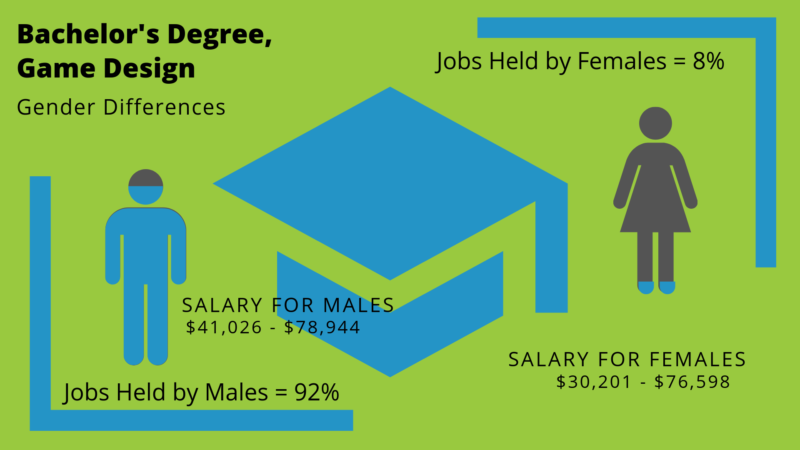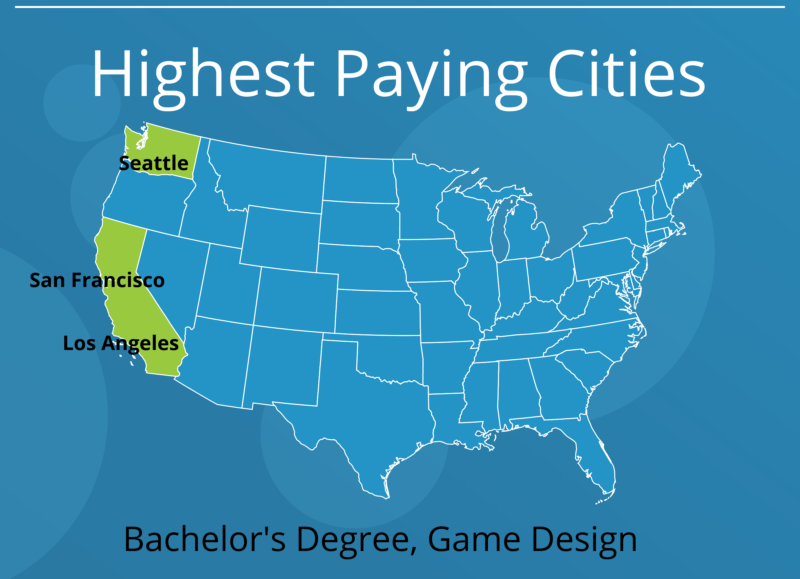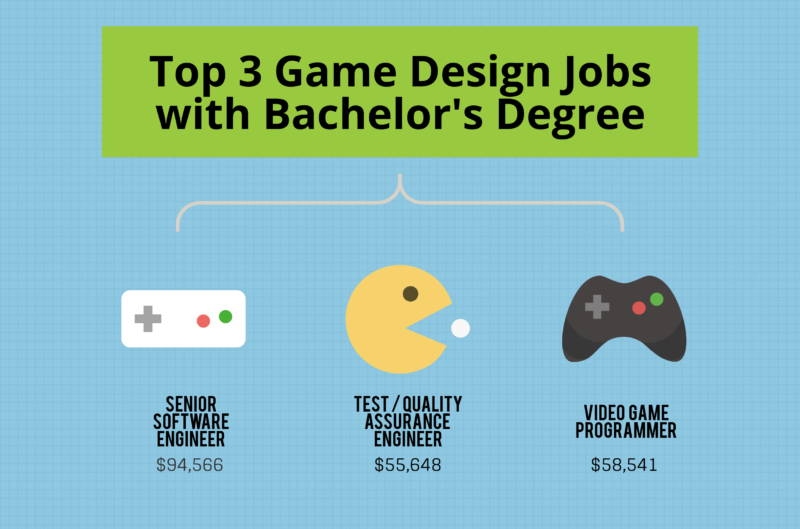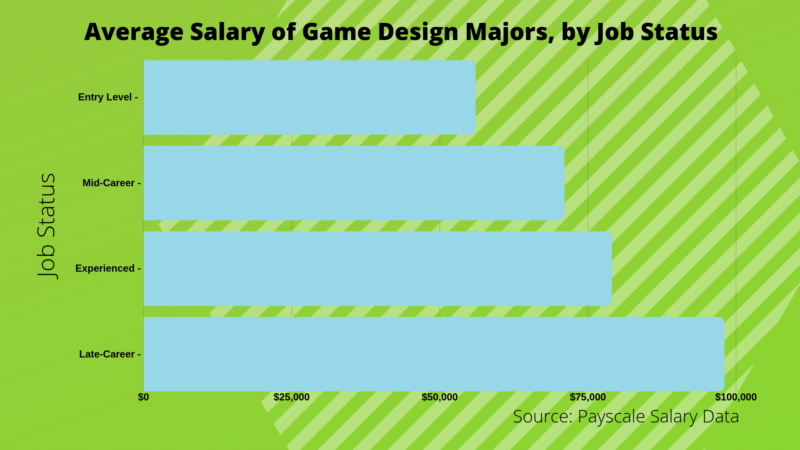Key Information:
- A game design degree opens up various career paths, including roles in game development, animation, software engineering, and interactive media.
- These programs emphasize skills in programming, graphic design, storytelling, and user experience, which are crucial for success in the gaming industry.
- The gaming industry is rapidly growing, offering many opportunities for game designers to work on diverse projects, from video games to educational tools.
Calling all gamers!
Have you ever asked yourself, what can I do with a game design degree? Or, what degree do I need to be a game designer? Or, How can I do what I love as a career? These are all great questions.
The world of game design is the creative application of art and technology in a digital environment — with a primary purpose to educate, to entertain, to train, or any combo thereof. A game’s final product requires many talented professionals, each contributing the game design fundamentals required to create dynamic, engaging game content.
The game design industry is colossal. Just one segment of the game design industry — video games in the US — is anticipated to exceed a value of $20 billion in 2020. And worldwide, economists project nearly $140 billion.
Related:
- Best Bachelor’s in Game Design Degree Programs
- Best Online Game Design Degree Bachelor’s Programs
- Fastest Online Game Design Degree Bachelor’s Programs
- Most Affordable Game Design Degree Bachelor Programs

Who is a Game Designer?
A game designer is tasked with the responsibility of detailing the concepts/rules of the gaming experience. These include:
- Art, Style and Game Feel
- Difficulty Level
- Game Requirements
- Player Characteristics, Behaviors, and Missions
- Scoring Mechanisms
- Storyline Features and Direction
- Type of Game — i.e. casino, card, simulation, or role-playing
- Usability
Essentially, a designer is responsible for creating the world in which the game exists.
From an academic perspective, the art of game design requires rigorous education and hands-on experience in game theory, strategy & decision-making, artificial intelligence, and probability, among others.
So, if you are still asking yourself, is a game design degree worth it? The answer is a resounding yes. Let’s learn how and why.
Accreditation for Computer Science and Game Design
Accreditation, simply put, is a third party-peer review process with origins traceable back to the early 1900s.
Accreditation is a review method whereby independent oversight agencies (often regulated by the specific industry or the government) evaluate a school or a degree program against a set of pre-defined criteria. Academic accreditation in the 21st-century educational community has been radically decentralized. Currently, teams of industry experts and educational professionals define the standards by which accreditation is measured. These are reviewed annually.
The accreditation process sets forth a benchmark on which an industry (mostly educators and students) has a consistent yardstick by which students can determine if a school will deliver on its education promises. Employers, when determining the quality of job candidates, consider if the student holds a degree from an accredited school or degree programs — before deciding on which job applicant is the right candidate.
From a game design student’s perspective, an accreditation for computer science programs is a valuable way to ensure the game design program or school meets fundamental game design industry standards. An accredited game design program signifies a designation of approval, similar to a seal of quality assurance.
Accreditation is generally divided into three categories — National, Regional, and Specialization. Programs, Colleges, Schools, and institutions are capable of receiving accreditation from a variety of industry-approved accreditation agencies.
Regional Accreditation
Regional accreditation is a voluntary process that is the responsibility of each school’s administration. A regionally accredited school typically allows for the transfer of credit units earned from a different regionally accredited institution of higher learning. Although most regionally accredited schools are reluctant, some will allow the transfer from a nationally accredited school, on a case-by-case basis.
Regional accrediting agencies administer their oversight services to a defined geographic region within the country. Regional accreditation is considered the standard for higher education by the US Department of Education.
Specialized Program Accreditation
Specialized Accreditation follows the same evaluative process; the difference is that the accreditation processes focus on a very specific topic or program. The gold standard to engineering and related fields is ABET.
ABET Accreditation
The ABET accreditation process (which was formerly known as the Accreditation Board for Engineering, and Technology) focuses on STEM education degree programs. Graduates from ABET-accredited programs bring forward a designation that impacts their career path as future employers understand their education includes ABET accreditation requirements.
ABET accredits postsecondary programs offered by institutions of higher learning that have been regionally accredited. ABET does not accredit doctoral degree programs or certificate programs.
Is ABET Accreditation Important for Computer Science Degree Programs?
ABET-accredited schools, including ABET-accredited online schools, offer students an assurance that the game design program of interest meets the ABET accreditation requirements– set forth by professionals and industry experts in the fields of Technology, Engineering, Computing, and Applied Science.
Note: ABET-accredited online schools meet the exact same requirements of programs offered on-campus.

Types of Video Game Design and Development Degrees
When video games first hit the market nearly 40 years ago, a video game design degree would have been unthinkable. The industry was in its infancy — the fickle marketplace had yet to decide if the video game revolution was here to stay — and programmers were garage tinkerers and hard-core nerds. However, market research today reveals that video games are no longer considered child’s play. Seniors and educators take advantage of the mental agility (and fun) offered by digital gameplay. Video games are quite effective in training groups and individuals.
Game Design degree programs now offer game art degree majors an opportunity to apply for game designer jobs — creating video games with entertainment, edutainment or a training objective.
Game design schools and game design colleges offering game design degree programs are now more widely available. Many game design bachelor’s degree programs are offered on campus, while some bachelor of arts in game design programs are delivered online or in a hybrid format — a combination of video game online courses and traditional classroom/lab coursework.
Top game design colleges that offer video game designer training are easily identified by a quick Internet search using phrases like Video Game Design Schools Near Me and Gaming Schools Near Me. For those students only interested in game design schools online, search for the right game design schools online using phrases like Game Design Degree Online, Game Design Schools Online, or Online from the best game design colleges.
Game development colleges and game development schools offer a game development degree Online in three general categories:
- Computer Programming
- Game Design
- Game Development
Video Game Design Degree Specializations
Game design colleges and game development schools now offer specialty degree in game design and development programs. The video game designer degree requirements for these specialties incorporate the video design basics of art, animation, art history, design analysis, and game strategy. Game design schools offer programs to prepare students for careers as
- Art Director
- Creative Director
- Level Designer
- Storyboard/concept Director
- Three-Dimensional or Textural Artist
- Visual Effects Director
A degree in video game development from top game design colleges can now open the door to many career opportunities in the gameplay industry.
Bachelor’s in Game Design
A game design bachelor’s degree program typically meets the video game designer degree requirements for most entry-level video design positions. A Bachelor’s in Game Design degree offered by some of the best game design colleges is a prudent education path to a successful gameplay design career.
An undergraduate game art degree often includes the successful completion of a practicum or internship to graduate. A bachelor’s game development degree graduate (with hands-on professional experience) is well-positioned as a competitive job candidate when entering the game design field.
The Take-Away
Students are advised to research game design online courses completely before deciding which of the names on the narrowed list of game development colleges is the right fit. Would a game development degree online be best? Or would it be best, to begin with, video game designer training?
So, if you search for:
- Game Design Online Courses?
- A Game Design Degree Online?
- Video Game Design Schools Near Me? or,
- An Online Game Development degree from Gaming Schools Near Me?
You will soon learn that there are many top game design colleges available to meet your needs, and the right online game development degree is waiting for you.
Certifications and Licenses in Game Design and Development
Certifications and licenses, in general, act as written evidence that a neutral 3rd party has evaluated an individual’s knowledge and skill level. This written assurance of an individual’s qualifications is generally granted by:
- Governmental and governing agencies issue professional licenses
- Universities, schools, and professional organizations issue certifications
Most certifications and licenses are issued with an expiration date, while others remain in effect if the license/certificate holder meets the issuer’s yearly requirements in the form of yearly dues/fees and continuing education. In general, a license or certification is in place to protect the public.

The Game Design Industry & Game Designer Qualifications
The video game industry has grown into a seriously large and profitable segment of the gaming industry. Typically, game designer qualifications, at a bare minimum, require the individual to possess the following game design skills:
- Adept Communication Skills
- Artistic flair, or a comprehensive arts education, or both
- Attention to detail, project management, and budgetary skills
- Extensive technical knowledge in the realm of computers and graphics
- Game Level Expertise
- User-Interface Concepts
- Video Technology
These game design skills are generally gained through a bachelor’s degree program that is completed over four to five years. However, it is possible to earn a game design certificate at a nearby college or university, or one can earn a game design online certificate from the many outstanding programs offered through distance learning options.
These online video game design certificate programs and game design and development courses offer convenience and the flexibility to study when a student has the time, any time — day or night. A game design certificate online program is often the best way to gain knowledge and skill while working full time.
There are game design online free programs by many prestigious universities available through the growing use of MOOCs — Massive Open Online Courses. Students enrolled in the game design online free programs often have the option of paying a nominal fee for a written certificate denoting the student’s successful completion of coursework.
A Word about On the Job Training (OJT), or How to Become a Game Designer without a Degree
Typically, video game developers and designers enter the gameplay workforce with a bachelor’s degree in a game design-related field. However, some individuals can obtain the required game design qualifications through employers who have a dedicated on-the-job training program. Still, others begin their video designer careers as interns, learning from the ground up, as they go.
In some ways, this sort of training could be viewed as a ‘paid mentorship.’ Newbies to the company sit alongside members of the game design development team and train for each role in the game design. During this time, the employer, and the employee can decide if the job, the company, and the individual are the right fit.
Often, OJT employees supplement the training with short coursework online or by attending a ‘brick and mortar’ classroom.
Additionally, it is noted that the game design industry, due to its highly technical underpinnings, is in a constant state of change and development. It is critical for all video game professionals to remain current with market conditions and the skills needed to remain in demand.
Careers in Video Game Design and Development
A video game designer is a critical part of the game development process of design, coordination, and implementation of a new gaming experience. Game development jobs include:
- Animation/Art Design/Graphics
- Character Design
- Code Writing — Varying Languages
- Gameplay rules
- Level Relationship Design, Pattern, and Alignment
- Music, Sound Effects, Music Mixing, Original Scores
- Overall Project Management, manual creation
- Prototyping and testing methods to reveal errors and offer suggestions for
- improvement
- Puzzle Configuration
- Scoring Methodologies
- Storyline Development and Writing
In addition, a game designer job requires a versatile team player. In the early days, a commercial game could be programmed by one person, but today, development on a serious video game can take years or work by many specialized teams, all of whom contribute something to the process. The era of the lone pioneering genius are behind us — the field is just too complex for any single person.
Video Game Designer Education Requirements
The majority of game development jobs require job applicants to possess a baccalaureate degree (or higher) in a gameplay related field. As such, except in unique circumstances, video game designer education requirements include a bachelor’s level degree is a relevant topic/subject.
The talents required to fill the variety of video game design jobs necessary to create an exceptional video game come from the fields of art, computers, software specialists, graphic design, fine art, scriptwriting, musical composition, and business. Together, each video designer job contributes to the ultimate creation of interactive gameplay experience for entertainment, training or education.
Video Game Design Jobs
Entry-level game development jobs as a character, or storyboard artist, or as a computer programmer. With experience, video game design jobs grow to include that of a level developer, a textural designer, or animator. Through additional experience and certifications/additional education, game development jobs may include a mix and match of:
- Animator
- Artificial Intelligence Programmer
- Creative Director
- Game Balancer — Fun, Difficulty-level, Optimization integrator
- Game Designer, a game visionary
- Game Engineer
- Gaming Programmer
- Lead Artist
- Lead Storyteller
- Modeler
- Music Engineer
- Project Manager
- Puzzle Designer
- Scoring Wizard
- Simulations Programmer
- Software Applications Developer
- Tools Programmer
- Video-Game Developer
The Video Game Designer Job Outlook
The video game industry rivals in size to that of the film industry and is anticipated to continue with strong growth in the near future. With technology exploding in every imaginable direction, the video game designer job outlook looks quite positive.
The federal government’s Bureau of Labor Statistics (BLS) reveals that the video game industry — the industry, in which a video game designer specializes, is anticipated to grow at an eight percent rate between the years of 2016 and 2026. It is noted that the video game industry’s anticipated growth exceeds the average growth of all industries combined through the year 2026.

Salary Expectations for Video Game Design
Given the fact that the computer gaming industry is valued in the tens of billions of dollars, it would be no surprise to learn that the median video game designer salary exceeds $72,000 (or $34.87/hour) per year. Of course, $72,000 is only an average video game design salary, so it is noted that game designers’ salaries vary from region to region across the country.
The United States government’s Bureau of Labor Statistics (BLS) reveals that the video game industry is anticipated to grow at an 8% rate through the year 2026 — faster than the average of all industries combined.
The video game industry’s strong projected growth will create robust demand for video game design talent. Ultimately, the economies of supply and demand will drive up video game designer salary and game development salary. On the other hand, video game design salary depends on experience; an individual who stays in the field will see game design and development salary go up with time.
The game development salary most in demand, at least for today’s current marketplace, is for those game design professionals with extensive training in gameplay industry specialties; such as a 3D artist, an Unreal Game Developer, and an Expert Mobile Game Developer, to name just a few.
Salary Expectations for Game Designers and Developers
Like most professions and careers, a video game designer salary varies based upon the professional’s length, depth, and breadth of video game design industry experience. Through experience, professionals develop skill sets and unique abilities. These often-intangible skill factors (built through personal and professional experience) drive a video game design salary in the upward direction. A decade ago, graphics programmers received premium salaries for their work. More recently, server programmers were receiving a salary premium.
As one fine-tunes their career path, it is important to stay current with salary trends in the game design industry and take advantage of industry specialty demand shifts as they occur.
Game Design Employment Benefits
Many game design professionals receive additional compensation in the form of financial benefits and bonuses. Additional benefits include
- Medical Insurance
- Dental Insurance
- Employer-Sponsored Retirement Programs — often with employer contributions
Professional Organizations in the Video Game Industry
A professional organization can be found in every field and industry. Professional organizations are created for a variety of purposes, such as offering an update regarding industry news & trends. However, most video game organizations undertake the role of the industry’s voice, advocating for the industry and its members with the government and the public.
Professional organizations for video game designers are no different. Student (and new video game professionals) membership costs are typically reduced for these video game associations; making the professional membership quite affordable, and thus valuable.
A membership to one of the available video game organizations generally includes:
Mentorship: Like many industries, video game professionals follow the belief that mentorship is often a critical component for young video game professionals’ success. The professional organization, through a selection process, match up game design seasoned professionals with those new to the profession. Mentorships are invaluable learning tools.
Job Boards: Each professional organization decides on just how complex its job listing services will be. Check out each potential professional organization to learn more.
Professional Development/Continuing Education: Many video game organizations operate with an education division that coordinates workshops, continuing education classes, video game designer publications, and a members-only website.
Networking: Prior to the introduction of the super information highway last century, professional organizations were often the best way to network among specific industry’s professionals gathered in a social setting, like a conference or a job fair.
Scholarships: Many professional organizations offer scholarships for a video game design education. The types of scholarship and the amounts rewarded vary from one professional organization to another.
The International Game Developers Association (IGDA)
The International Game Developers Association holds the distinction of being the largest nonprofit professional organization supporting the many and varied professionals that contribute to the creation of games. The International Game Developers Association categorizes video game professionals into four basic groups — Lead Designers, Game Designers, Writers, and Level Designers.
The IGDA uses its global presence to organize the world’s video game professionals:
- Artists
- Computer Programmers
- Designers
- Game Development Business Professionals
- Producers
- Writers
IGDA welcomes video game professionals who work on a PC, mobile, tabletop, VR/AR or a console device.
The Video Game Bar Association (VGBA)
The Video Game Bar Association is a professional organization/entity that supports video game professionals as they reach for the professional’s highest level of professionalism and expertise. The careful management of many legal and governmental procedures required to operate on a nationwide and global scale accomplishes this. VGBA serves its members by seeking to improve the video game profession — by advancing the rule of law.
The David S. Rosenbaum Scholarship
This scholarship is awarded in honor of one of the Video Game Bar Association’s co-founders; David S. Rosenbaum. This honor is awarded a $2,500 scholarship and an invitation to the VGBA Annual Conference.
The Academy of Interactive Arts & Sciences (AIAS)
The Academy of Interactive Arts & Sciences, founded in the mid-1990s, is a professional organization that seeks to recognize and advance the global community of interactive entertainment professionals. The AIAS is 30,000 members strong; with members representing interactive game designers, game developers, and publishing leadership members from across the globe. AIAS leads the Design, Innovate, Communicate, and Entertain Annual Apex conference; a yearly dialogue regarding the state of the video game design industry.
